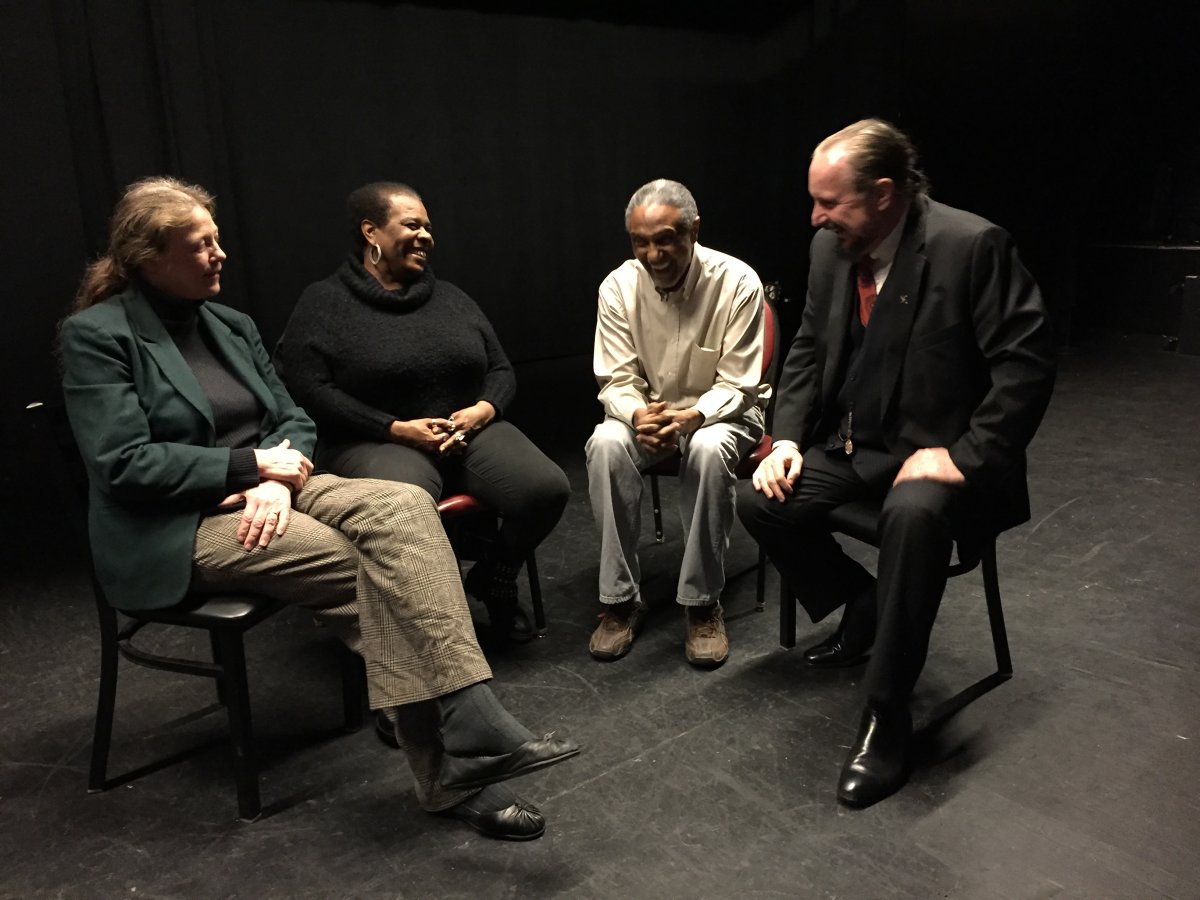
BY AMY RUSSO | Two weeks ago, on the quiet, empty stage at Theatre 80 St. Mark’s, owner Lorcan Otway sat with Karen Brown and Charles Weldon of the Negro Ensemble Company to discuss the planned return of the historic theater company to the East Village.
Since 1965, N.E.C. has been one of New York’s most notable theater groups of color, giving rise to a long list of top actors, from the likes of Adolph Caesar to Samuel L. Jackson and Denzel Washington. But struggles for funding and recognition among mainstream audiences have proved challenging. The move of N.E.C. to Theatre 80 may help to change that, explained Brown, the company’s executive director.
“We now have an opportunity with this relationship to solicit more funding, number one, to do better marketing because, as small as N.E.C. has been, the marketing of all of our artistic offerings has been a little tough because we’re so small,” Brown said. “So being here gives us an opportunity to get ahead where we’ve been struggling.”
N.E.C.’s training programs will be relocated to the second floor of Theatre 80, at 80 St. Mark’s Place. There, nine workshops — including acting, playwrighting, stage management, directing and three levels of dance — will be taught.
N.E.C.’s school was founded in 1967 to give artists of color a platform where they could practice and cultivate their talent.
“The idea was to create professionals who are very highly trained, who are wonderfully talented and very, very significantly skilled, in a culture that accepted only one or two,” Brown said. “Because one of the things about this town, you cannot throw a rock without hitting a theater artist. You just can’t do it. And it’s irrelevant their ethnicity, what they look like, whether they’re straight or gay, whether they’re tall or short. That’s irrelevant.”
Otway, Brown and Weldon emphasized the void of artistic homes that have existed for actors of color and the marginalization black theater still faces today.
Weldon, a longtime member of the theater scene and N.E.C.’s artistic director, recalled coming to New York as an actor but feeling lost once the play in which he was performing closed. While debating whether to return home and leave the city he immediately loved, he was encouraged to audition for a show at N.E.C. where he interacted with playwright Samm-Art Williams and Victor Willis. Willis is best known as the original leader singer of the Village People and lyricist of “Y.M.C.A.”
Weldon noted that these kind of encounters and relationships were possible because N.E.C. gave artists a space to grow and thrive. However, he doesn’t want this to be an idea of the past, but an ideal to which the company can once again return.
“We seem to always think of what we used to have,” he observed, “and I don’t want to do that with the Negro Ensemble Company. I want it to be what we still have and we’ll always have.”
The N.E.C. move blossomed out of a moment of inspiration last December when the company performed Douglas Turner Ward’s “Day of Absence” at Theatre 80 in celebration of N.E.C.’s 50th anniversary. Weldon, a self-described believer in happenstance, called the audience response “overwhelming.”
“It was people coming from all over just because we were back on St. Mark’s,” he recalled. “And a lot of people that came remembered when we were down the street. And so it just kind of all came together. And I think that’s when the idea came that, ‘What if we make something out of this? Let’s not let it just pass us by.’ ”
All three agreed that the expanded partnership had arrived at a particularly relevant time. Recognizing continuing racial divides in our society, Otway foresees N.E.C. as a spark for a cultural renaissance, as it was in the ’60s and ’70s.
“We began to evaluate where America was at this time,” he said, reflecting on the significance of the move. “And we realized that this couldn’t be a one-shot event, that we are in a country that has lost its direction, and that when you look to re-establish political direction, you have to begin with cultural direction.”
It’s expected the full move of N.E.C.’s entire operation to Theatre 80 will take up to two years. Meanwhile, the company’s training program will begin hosting classes in about six months at the St. Mark’s Place theater once the second-floor space has been renovated.


































